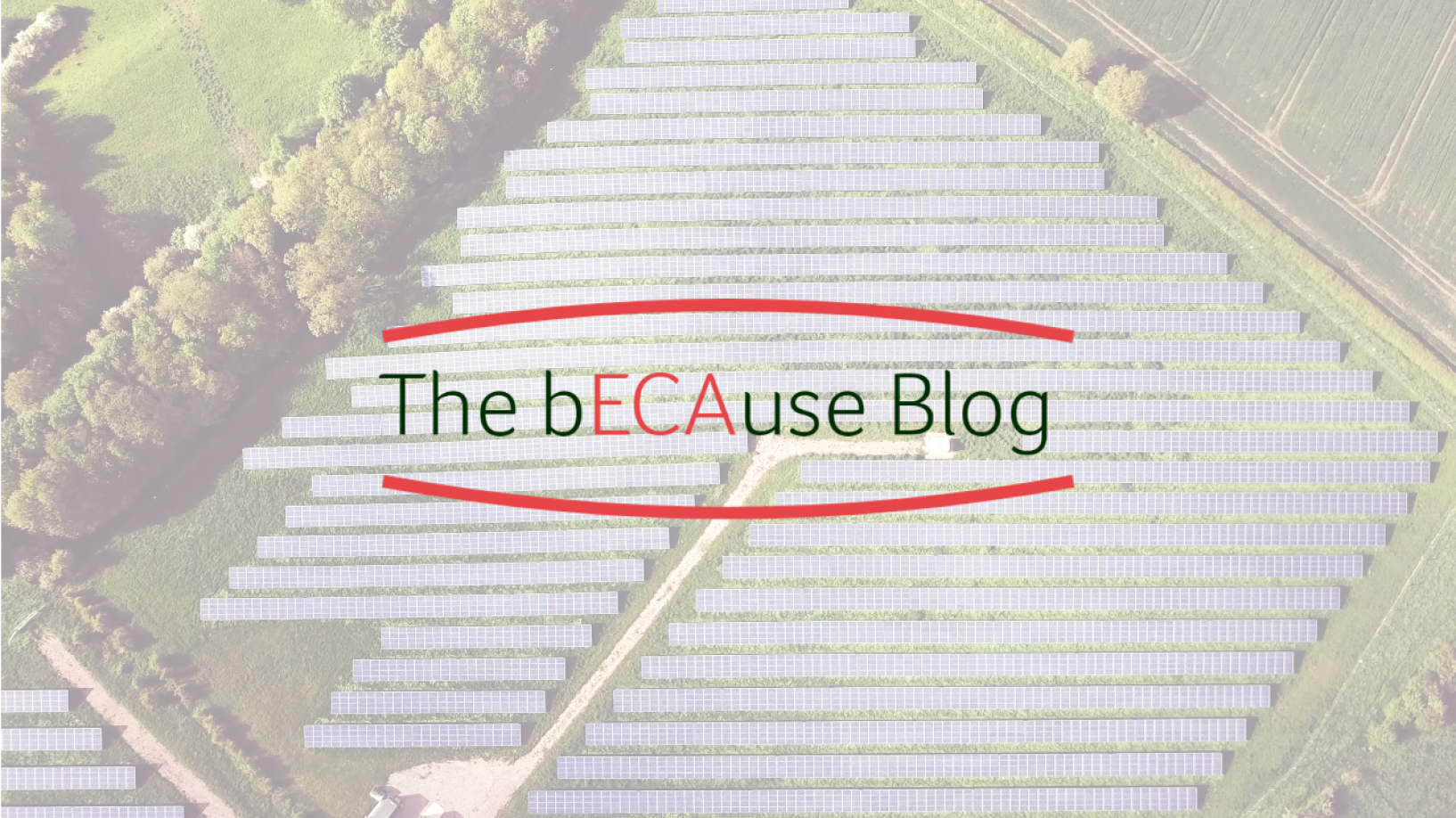Interest in solar energy has long been high in Australia. We lead the world – after all – at installing panels atop our homes.
Such behaviour is often based around ideas of either saving money or securing a sense of energy independence or self sufficiency. These come up frequently when we ask consumers why they are interested in installing solar systems and batteries.
But might we be seeing the beginning of a new phase of solar growth underpinned by some different values? One where we see consumer interest go ‘through the roof’ (and keep on travelling down the street and around the corner).
We are talking about local and shared energy resources: Solar gardens, and their storage cousins – community batteries.
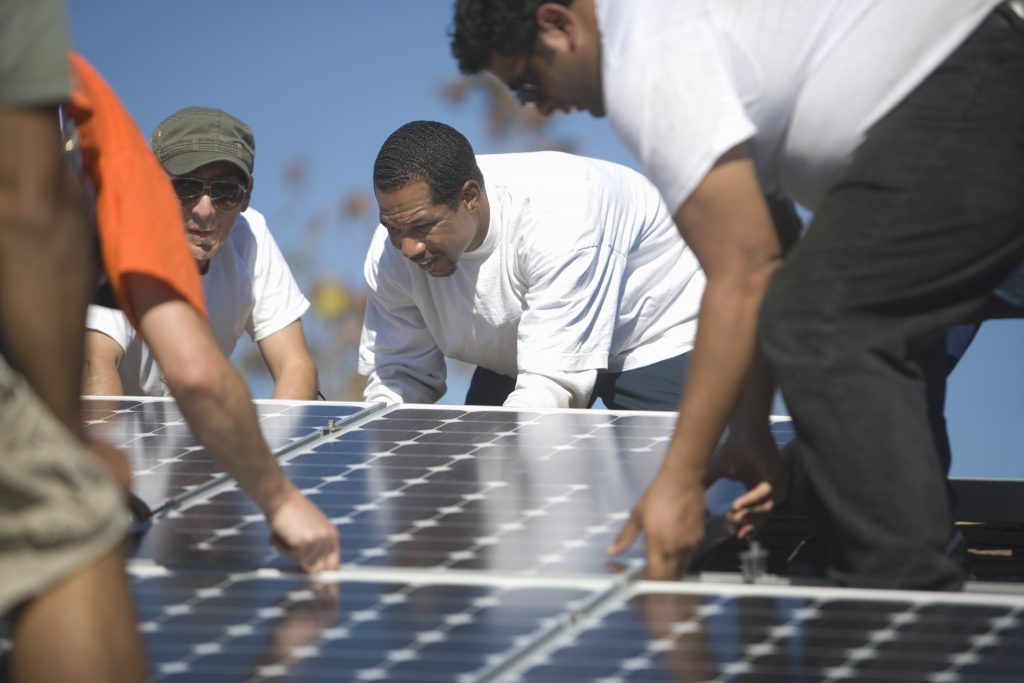
The December Energy Consumer Sentiment Survey from Energy Consumers Australia reveals booming consumer interest in new products, services and technical solutions that offer community-driven responses to the clean energy needs of Australians.
More than half of all consumers, (55%) said they were interested in buying power from a local community solar garden. And a whopping 71% of family households expressed interest in doing so.
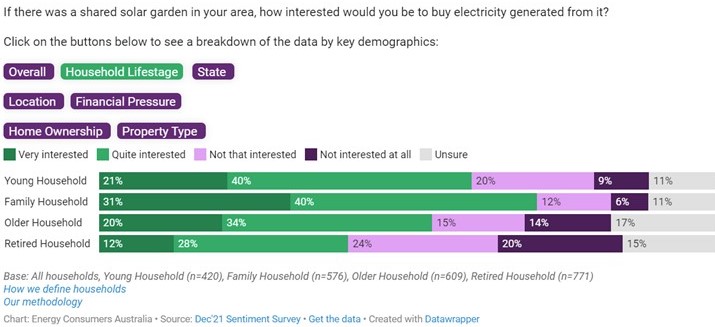
These questions, added as a ‘featured content’ section in the December edition of the nation’s leading indicator of energy consumer sentiment, tell the tale of a move towards more local and community-based generation and storage models. The survey reveals Australians are keen to make sure the benefits of solar and storage can be extended to the one third of Australian households that are unable to install solar panels on their own roof.
So what are solar gardens?
Originating in the United States, solar gardens are arrays of solar panels that are located together and connected to the grid. Consumers who are unable to install rooftop solar at their place of residence can invest in a ‘plot’ in the garden and be rewarded for their share of the energy exported back into the grid, as well as getting access to renewable energy for their own household needs at times when the garden is generating.
Not only does the survey reveal solar gardens are a popular idea, consumers are also keen to see greater investment in this area. 43% of household consumers surveyed said initiatives such as solar gardens should be supported by government investment.
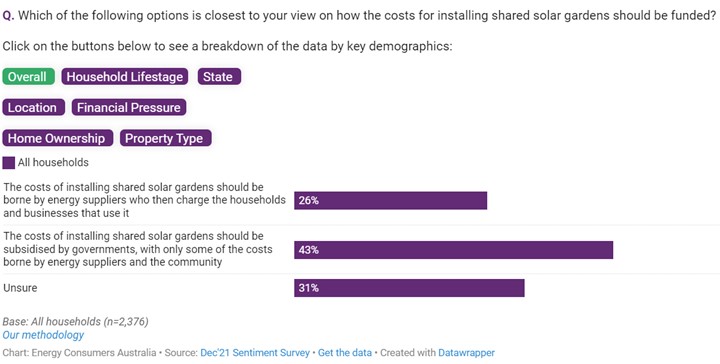
Australia has been relatively slow to embrace this kind of community approach to electricity generation. The nation’s first solar garden opened as a small pilot in Lismore NSW in 2019. According to this model, solar panels were placed on the roof of a community housing organisation. Shares in the garden were purchased by local businesses but were also made available to residents of apartment buildings run by the community housing organisation.
The nation’s first large-scale solar garden is planned for the NSW town of Grong Grong. A co-op of local residents has been created and members will soon be able to purchase plots in the solar garden, which will be located on the land of a local farmer and will be operational by mid-2022.
Many more might follow. The Federal Labor opposition also recently announced, as part of its climate policy, that it would build 85 ‘solar banks’ across Australia if it wins government (these are essentially the same as solar gardens – a rose by any other name.)
Beyond the garage wall
The survey finds Australians are interested not just in alternatives for rooftop solar generation but in moving beyond the garage wall when it comes to storage.
Of those surveyed, 57% said they were interested in shared or community batteries, while 69% of family households expressed interest in them.
And 43% of consumers surveyed believe that governments should subsidise community batteries.
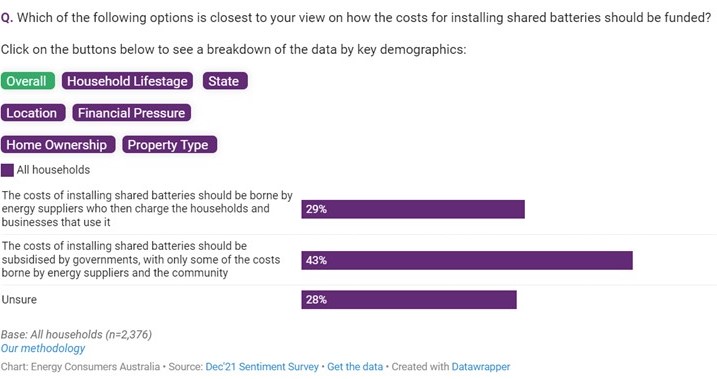
Community batteries, which can be located on a neighbourhood street or at a community facility such as a local school, civic building or business, offer consumers a local form of storage that does not need to be based on their premises but can bank electricity when solar panels are generating more than can be used, accessing it later when the consumer needs it.
Interest in these emerging forms of generation and storage is not just booming among householders. The survey reveals that small businesses also strongly support such measures, with 69% of SMEs saying they'd be interested in buying energy from a solar garden and 65% interested in sourcing energy from a shared battery.
Why the shift?
A decade or more of unrestrained growth in household rooftop solar has seen that resource grow to a point where panels now sit atop almost three million homes nationally. Home-based rooftop solar isn’t going away and it isn’t necessarily slowing either. The number of homes with solar panels is expected to double across the next decade.
Those who have gone solar have enjoyed free energy when the sun is shining and benefitted from generous feed-in tariffs (which are becoming less generous now that the amount of available solar energy now sometimes outstrips total demand).
But many Australians have been unable to join in the solar revolution that has helped transform our energy system. Renters, people who live in apartments and people with unsuitable roofs have been unable to participate, as have those for whom the initial outlay for a solar or storage system remains prohibitively expensive.
At ECA we often say the energy system needs to meet the values, needs and expectations of consumers. When we talk about things like adding rooftop solar, values are critical.
And while Australians have shown they do prioritise independence as one of those values, there is another one that frequently comes up when we examine what Australians want their energy system to be. Fairness.
Access for everyone
The survey finds respondents across the nation value fairness when it comes to accessing renewable energy at a household level and want to make sure the benefits of solar are open to all.
A clear majority (59%) say it is unfair that renters can’t access solar (with 73% of renters sharing that sentiment). And the same number (59%) say it's unfair that people living in units and high-rise buildings can’t access solar (with 71% of unit flat or apartment dwellers agreeing).
There is a clear interest from our respondents in seeing action to resolve these access problems, with 58% of household consumers saying that governments should act to address these issues.
When it comes to government-led action, an obvious starting point is public housing, where state and local governments have a higher degree of control over outcomes. That’s reflected by the survey, with 73% of respondents saying government should install rooftop solar panels in public and community housing.
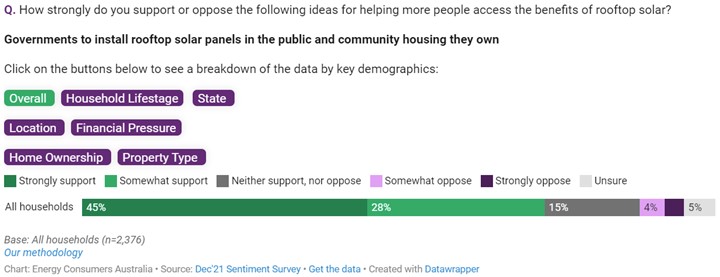
More local and community based generation and storage is not just helpful for those who are currently excluded. It also offers the possibility of a more resilient future system, where consumer access to electricity is not as dependent on long transmission lines that can cause mass outages as a result of a single fault.
Respondents clearly view the task ahead as an area of shared responsibility, with 71% of survey respondents wanting governments to incentivise landlords to install solar, while 58% agree that energy suppliers should offer products that allow renters to buy energy generated from their neighbours’ solar systems.
And 60% say that apartment complex owners should be required to install solar panels and battery storage systems, as long as the building means its practical to do so.
The December survey reveals plenty of interest in a future energy system that is fairer, more local and more community-based – but how urgently and how strongly do Australians actually feel about these priorities? Perhaps more than many might have suspected.
The survey reveals 58% of respondents said government should treat helping people who live in units and high-rise buildings getting the benefits of rooftop solar and battery storage as a high priority. At ECA, these objectives do match our stated priorities, so it is pleasing to see that working towards them will be helping to meet the values, needs and expectations of the energy consumers whose interests we work to advance.
